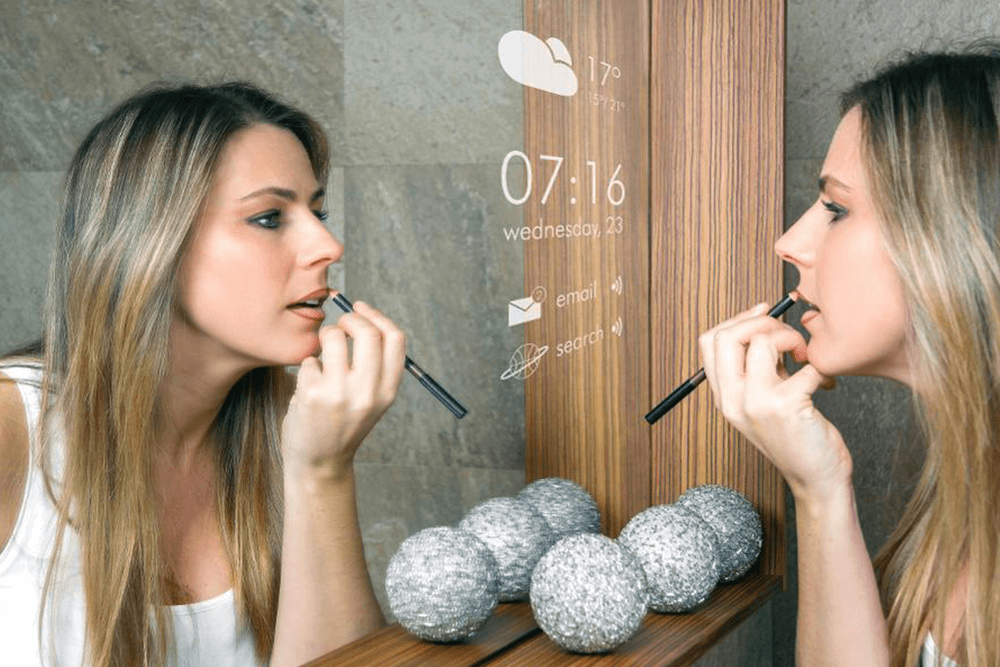The Magic Of Smart Mirrors: Artificial Intelligence, Augmented Reality And The Internet of Things
2 July 2021
“Mirror, mirror on the wall…” The idea of a mirror not only reflecting your image back to you but also augmenting it is no longer a fairytale. Several companies have made significant progress in creating smart mirrors, also called digital mirrors or smart displays, that can help you in the dressing room as well as when you’re in the hair stylist’s seat or shopping for makeup.

Technology Behind Smart Mirrors
The silver-glassed mirrors most of us are familiar with today got their start more than 200 years ago in Germany. While they still serve a useful purpose when reflecting your image back to you, some fashion and beauty leaders figured that if you added smart technology to mirrors, they could elevate the customer experience. This vision is now a reality thanks to the significant advances that have been made in artificial intelligence, augmented reality, and gesture recognition technology. These mirrors can adjust your image, including the clothes you wear to your hairstyle, hair colour, and makeup to create a very realistic augmented reflection.
Applications of Smart Mirrors
The beauty of a digital makeover is it’s easy to experiment and hit “undo” when you don’t like the results. L’Oréal launched an app called Style My Hair in partnership with ModiFace that allows customers to become a blonde (or any other hair colour)—at least digitally—on live video. The technology colours hair strand by strand to create a fully dimensional, realistic look. Not loving blonde? Just swipe on the app and change your colour again. This technology is beneficial when a colorist consults with a client regarding what they want and lets the client see—quite effectively—how the colour will look on them prior to committing to the real thing.
YouCam Makeup-Magic Selfie Cam, developed by Perfect Corp, is a similar app that can show you what you’ll look like with a new hair colour (and eye colour), try on makeup as well as a skincare analysis feature that identifies issues to troubleshoot with a skincare routine. Shopping for cosmetics in real-life can involve taking makeup on and off as you try new shades of highlighter, foundation, blush, lipstick, and eye shadow. Being able to do this virtually prevents any adverse reactions, especially for sensitive skin and makes experimentation easy as you swap between different options.
The same technology can help people see how a new hairstyle will complement their face—or not—before any irreversible cuts are made. It can also be helpful to determine a style for a special occasion or see how a style you saw in a magazine will work with your face shape before you head to the salon.
Coty’s version of the smart mirror is the CES 2019 Innovation Awards Honoree—Wella Professionals Smart Mirror. This mirror allows stylists to provide more personalised consultations. Like the apps discussed above, the Wella Professionals Smart Mirror is able to do a live AR hair colour try on and can provide a 360-degree of the style so the client can see what it will look like from all angles. In addition, using facial recognition technology, it can retrieve past styles for each customer, allowing the stylist and client to really assess what worked and what didn’t. Also important, the mirror provides a curated feed of content with trending styles and classic looks to help inspire both stylists and customers when trying to determine a new look. It also connects to a mobile app so the stylist and customer can stay in contact in between appointments.
Memory Mirror, a digital mirror created by MemoMi, combines a full-length mirror with high-tech including a 70-inch LCD, computer and HD camera that can record videos so you can save, share and review your try-on sessions. Neiman Marcus installed MemoMi’s mirrors in 34 locations. Another mirror altering the retail experience is the Oak Mirror by Oak Labs. It serves as a digital assistant in a dressing room, allowing customers to request other colours, styles, or accessories from a sales assistant.
Sephora is another beauty retailer that offers a 3D augmented reality mirror. Customers trying out different products can move their face from side to side, and the augmented eye shadow or lipstick stays where it is supposed to creating a very realistic effect. The technology is expected to not only enhance the customer experience but drive sales. When it’s easier to experiment with different looks, it makes it easier to discover new products to purchase.
While your haircut, hair colour, and makeup choices are important for your overall look, SenseMi expanded the makeover capabilities to create a virtual dressing mirror, too. The company’s smart mirror is used in retail stores, and there’s a home version that allows you to “try” on clothes digitally, plus it’s able to send you reminders about your calendar, tell you the traffic details along your normal commuting route and more. SenseMi even sells a smart table that provides a multi-touch, interactive experience that can be used in hotels, schools, hospitals, and more.
Artificial intelligence, augmented reality, and virtual reality will help to make retail stores more interactive and the online experience more real-life. Perhaps more importantly, with the help of makeover apps and smart mirrors, the days of bad haircuts, and colour and makeup choices will be a thing of the past.
Related Articles
6 Powerful AI Prompts That Will Help You Learn And Ace Exams (Without Cheating)
By now, “smart” versions exist of just about every home appliance, gadget and gizmos we can think of. However, manufacturers continue[...]
5 Fatal GenAI Mistakes That Could Destroy Your Business In 2025
By now, “smart” versions exist of just about every home appliance, gadget and gizmos we can think of. However, manufacturers continue[...]
4 Game-Changing Quantum Computer Types That Could Transform Everything
By now, “smart” versions exist of just about every home appliance, gadget and gizmos we can think of. However, manufacturers continue[...]
AI’s Competitive Edge: Turning Data Challenges Into Business Success
By now, “smart” versions exist of just about every home appliance, gadget and gizmos we can think of. However, manufacturers continue[...]
The Everything AI: How Google’s Super Assistant Could Change Life As We Know It
By now, “smart” versions exist of just about every home appliance, gadget and gizmos we can think of. However, manufacturers continue[...]
5 Amazing Things You Can Do With ChatGPT’s New Operator Mode?
By now, “smart” versions exist of just about every home appliance, gadget and gizmos we can think of. However, manufacturers continue[...]
Sign up to Stay in Touch!
Bernard Marr is a world-renowned futurist, influencer and thought leader in the fields of business and technology, with a passion for using technology for the good of humanity.
He is a best-selling author of over 20 books, writes a regular column for Forbes and advises and coaches many of the world’s best-known organisations.
He has a combined following of 4 million people across his social media channels and newsletters and was ranked by LinkedIn as one of the top 5 business influencers in the world.
Bernard’s latest book is ‘Generative AI in Practice’.










Social Media